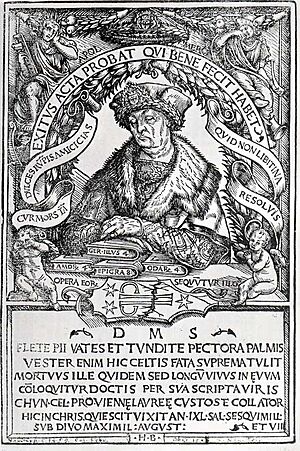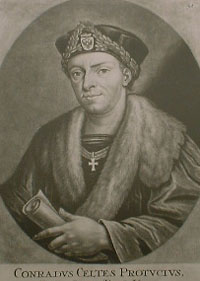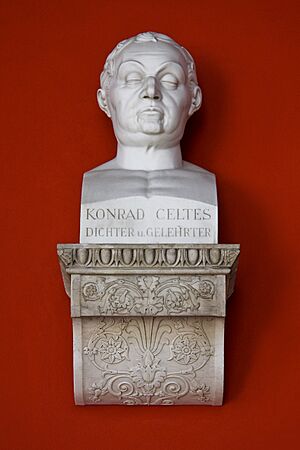Conrad Celtes facts for kids
Quick facts for kids
Conrad Celtes
|
|
|---|---|

Epitaph of Conrad Celtes, woodcut by Hans Burgkmair, 1507
|
|
| Born | 1 February 1459 Wipfeld (present-day Lower Franconia)
|
| Died | 4 February 1508 (aged 49) |
| Nationality | German |
| Other names | Conradus Celtis Protucius |
| Education | University of Cologne (B.A., 1479) University of Heidelberg (M.A., 1485) Jagiellonian University |
| Scientific career | |
| Fields | History |
| Institutions | University of Ingolstadt University of Vienna |
Conrad Celtes (born Konrad Bickel; 1 February 1459 – 4 February 1508) was an important German scholar and poet. He lived during the German Renaissance, a time when people rediscovered old Greek and Roman ideas.
Celtes is often called "the Archhumanist" because he was one of the most influential German humanists. He was known for his poetry and for helping to organize and spread humanist ideas across Germany. He also helped change how subjects were taught at the university in Vienna.
Contents
Life of Conrad Celtes
Conrad Celtes was born in a small town called Wipfeld, near Schweinfurt. His original name was Konrad Bickel. He didn't want to follow his father's trade as a winemaker. Instead, he chose to study.
Early Studies and Travels
Celtes went to the University of Cologne from 1477 to 1479. He earned his first degree there. Later, he studied at the University of Heidelberg, getting his master's degree in 1485. While studying, he met important teachers who helped him.
Like many scholars of his time, he changed his name to a Latin version, Conradus Celtis. He traveled a lot, giving lectures about humanist ideas in cities like Erfurt, Rostock, and Leipzig. His first book, published in 1486, was about how to write poems. He also visited famous cities in Italy, such as Rome and Venice, to learn more.
Becoming a Poet Laureate
The ruler of Saxony, Frederick III, was impressed by Celtes. He asked Emperor Frederick III to honor Celtes. The Emperor then named Conrad Celtes a Poet Laureate, which means an honored poet. This special ceremony happened in Nuremberg, where Celtes also received a doctoral degree. After this, he continued to travel and give lectures across the empire.
Societies and Discoveries
From 1489 to 1491, Celtes lived in Kraków, Poland. He studied math, astronomy, and science at the Jagiellonian University. There, he became friends with other humanists. He also started a group called the Sodalitas Litterarum Vistulana, a "Literary Society on the Vistula River." These societies were like clubs for scholars to share ideas.
He traveled through many cities, including Prague and Nuremberg. In Hungary, he started another literary society, which later moved to Vienna. He also founded the "Rhineland Literary Society" in Heidelberg. In 1492, in Ingolstadt, he gave a famous speech. He encouraged Germans to become as skilled in learning and writing as the Italians. This speech became very popular later on.
In 1494, Celtes found old Latin writings by a nun named Hrosvitha in a monastery. He was very excited about this discovery.
Teaching in Vienna
When a sickness spread in Ingolstadt, Celtes taught in Heidelberg. By then, he was a professor. In 1497, Emperor Maximilian I invited Celtes to Vienna. The Emperor honored him as a "teacher of poetry and conversation." This was a very special honor.
In Vienna, Celtes taught about ancient writers. In 1502, he started the Collegium Poetarum, a special college for poets. His friend Johannes Cuspinian helped him get this important invitation to Vienna. Conrad Celtes passed away in Vienna a few years later, in 1508.
Conrad Celtes' Works and Influence
Conrad Celtes' teachings had a lasting impact, especially in the study of classical languages and history. He helped make the teaching of Latin more organized. He also encouraged the study of ancient Greek and Roman writings. He was one of the first to teach world history as a complete subject.
Cartography and Geography
Celtes was a leading writer on maps and geography in German lands. He worked on a big project called Germania Illustrata, which means "Germany Illustrated." This project included his writings about Germany and four books of love poems. He also wrote about the city of Nuremberg. These works were published in 1502.
He was also the first to use the term "topography" in a new way. Topography is the study of the shapes and features of land. He used it to describe how Europe's map was changing quickly.
Important Discoveries
In 1493, Celtes found the writings of Hroswitha of Gandersheim. He helped to have these works printed widely in 1501. This was one of the earliest times that a special permission, like a copyright, was given by the government for printing a book.
Celtes also found an old map showing Roman Empire roads. This map is now known as the Tabula Peutingeriana, or Peutinger Table. As the librarian for the Emperor's library, Celtes collected many old Greek and Latin manuscripts. He once thought he had found missing parts of a famous poem by Ovid, but it turned out they were written by someone else much later. Still, many scholars believed him for a long time.
Celtes was very interested in ancient Roman and Greek culture. He admired Emperor Maximilian, and often wrote about their shared glory in his works.
Today, a school in Schweinfurt, Germany, the Celtis-Gymnasium, is named after Conrad Celtes.
See also
 In Spanish: Conrad Celtis para niños
In Spanish: Conrad Celtis para niños
 | Georgia Louise Harris Brown |
 | Julian Abele |
 | Norma Merrick Sklarek |
 | William Sidney Pittman |



